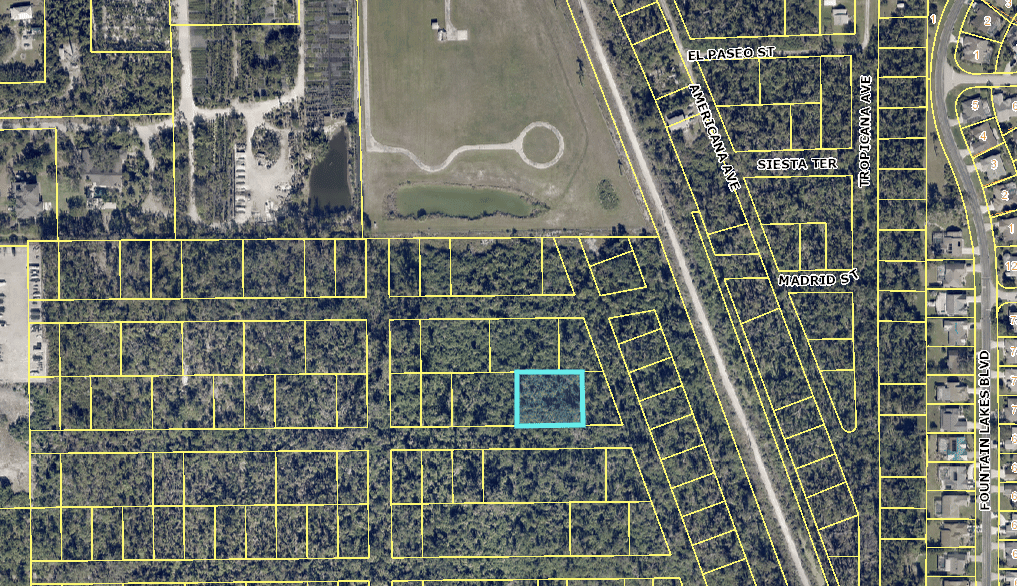What is Landlocked Property?
Landlocked property, defined as a parcel of land completely surrounded by other parcels with no direct access to a public road or right-of-way, presents unique challenges and opportunities for owners and potential developers alike.
In this article, we will delve into the various strategies and considerations involved in dealing with landlocked property, exploring legal, practical, and creative solutions to unlock its potential and maximize its value.
Understanding Landlocked Property

Landlocked property is a legal term referring to real estate that lacks direct access to a public road or thoroughfare, rendering it inaccessible without crossing over another’s property.
Take this picture for example. The blue square, as well as all the others around it, are all landlocked. In this situation, these lots may never be developed… Or if the blue square was a lot closer to a road that you see in the picture, then it could make sense to clear a road to your property.
This situation can arise due to poor planning, changes in property ownership over time, or deliberate actions such as subdividing larger parcels without proper consideration for access. Landlocked parcels are often considered less desirable and may face limitations on development and use.
Challenges Associated with Landlocked Property
- Access Constraints: The primary challenge with landlocked property is the absence of direct access to public or private roads, making it difficult for owners to utilize or develop the land effectively. Some areas, the city or county may make it a requirement that you have to install an asphalt road to your property which could be very expensive and not worth the cost.
- Legal Complexities: Resolving issues related to landlocked property typically involves navigating a complex web of legal regulations, easements, and property rights, which can be time-consuming and costly.
- Development Limitations: Without access to public roads, landlocked property may be subject to zoning restrictions and development limitations, reducing its potential value and utility.
Strategies for Dealing with Landlocked Property
- Negotiating Easements:
- Easements grant the right to use another person’s land for access or utility purposes. Negotiating easements with neighboring property owners can provide a legal pathway to access the landlocked property. This is assuming you have homes in the immediate area that you can work off of.
- Types of easements include ingress (entry) and egress (exit) easements, which allow for the passage to and from the landlocked parcel.
- Easement agreements should be drafted carefully to outline the terms of access, maintenance responsibilities, and any associated fees or obligations.
- Acquiring Access Rights:
- In some cases, it may be possible to purchase access rights from neighboring landowners or through eminent domain proceedings, wherein the government acquires private property for public use. This could prove to be costly.
- Acquiring access rights through negotiation or legal action can provide a permanent solution to the access problem, enhancing the value and marketability of the landlocked property.
- Creating a Private Access Road:
- Building a private access road or driveway to connect the landlocked property to a public road is another option, albeit a costly one.
- This approach requires obtaining the necessary permits, conducting engineering studies, and investing in construction, maintenance, and liability insurance for the access road. Not too mention brining in land fill if it is in a low lying area.
- Land Swap or Consolidation:
- In some cases, landlocked property owners may explore opportunities for land swaps or consolidations with adjacent landowners to gain access or improve the overall usability of their parcels.
- Consolidating adjacent parcels into a larger tract of land with shared access can enhance development potential and streamline management. This could be a great solution but could entail getting dozens and even hundreds of land owners on the same page.
- Seeking Variances or Zoning Changes:
- Owners of landlocked property can explore options for obtaining variances or seeking changes to zoning regulations to accommodate alternative access arrangements or development plans.
- This approach may involve engaging with local planning authorities, presenting feasibility studies, and demonstrating the potential benefits of the proposed changes.
- Exploring Alternative Uses:
- In situations where obtaining access proves to be challenging or cost-prohibitive, owners may consider alternative uses for the landlocked property, such as conservation, recreational, or agricultural purposes.
- Exploring creative and adaptive reuse options can help maximize the value and enjoyment of the property while mitigating access-related issues.
Dealing with landlocked property requires careful consideration of legal, logistical, and strategic factors to unlock its full potential. Whether through negotiating easements, acquiring access rights, building private access roads, or exploring alternative uses, owners and developers can overcome the challenges associated with landlocked parcels and transform them into valuable assets. By employing creative solutions and leveraging available resources, landlocked property can be effectively integrated into the broader landscape, contributing to sustainable development and economic growth.
